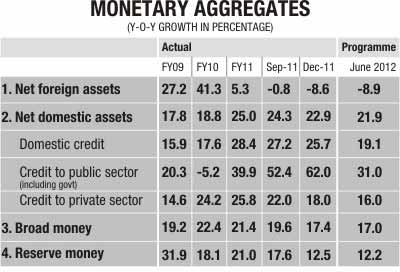Pressure on forex reserves to ease in months: BB

The central bank yesterday said the pressure on foreign exchange reserves would ease in the coming months due to a fall in the opening of new letters of credit and restraints on domestic credit environment that is expected to limit import growth further.
The Bangladesh Bank said the number of LC openings fell 8 percent in January compared to the same period a year ago.
A more restrained domestic credit environment will cut down import growth, the BB said in its Monetary Policy Statement for the second half of the current fiscal year.
The weaker taka will support export and remittance growth, the central bank said in the MPS released yesterday.
The central bank said the recent trends suggest that the pressure on foreign exchange reserves would ease in the coming months.
“We expect that new external sector equilibrium will be reached soon," the BB said.
On January 18, foreign currency reserve was at $9.04 billion, down from $10.91 billion on June 30 last year.
The BB also said the external sector is facing a challenging environment, and addressing this is an integral part of the bank's monetary stance.
Export growth, which was 14.7 percent during July-December last year, lagged behind the import growth at 22 percent between July and November, partly due to the projected 57 percent rise in petroleum imports in fiscal 2012 compared to the previous year.
November 2011 witnessed a negative current account balance for the first time in recent years as the negative trade balance was not compensated by remittances that grew by a robust 9.3 percent in the first six months of the current fiscal year, the BB said.
It said a sharp decline in net foreign aid (total aid minus payments) is another major reason behind the mounting pressures on the balance of payments.
The net aid for the July-November period in 2011 was $69 million, which accounted for only 7 percent of that received in July-November 2009.
"As a result of these multiple pressures, the exchange rate has depreciated, with the taka's value falling by around 15 percent vis-a-vis the US dollar in the twelve months preceding mid January 2012. The foreign exchange reserves have also fallen from $10.1 billion in to 9.2 billion during this period."
The central bank said remittances appear to have responded positively to the depreciation of the taka.
Migrant workers sent home a monthly record of $1.15 billion in December last year. Data from the first half of January points to a similar figure repeating itself, the BB said.
The central bank also said the fiscal stance is supportive of the government's growth strategy but the lack of foreign aid and unanticipated spending pressures have led to rapid growth of borrowing from the banking sector.
This reflects significant shortfalls in foreign borrowing, higher-than-expected subsidy payments and low levels of non-bank borrowing.
The non-bank borrowing can be enhanced if upward revisions to the interest rates on national savings schemes are made, the BB said.
The rising subsidy costs are piling up pressures on the government's domestic financing requirement, as state-owned enterprises providing fuel and electricity continue to make large losses, despite recent fuel and electricity price increases.
The subsidy is estimated at 3.4 percent of GDP or 19.1 percent of total spending in fiscal 12 compared to 1.3 percent of GDP or 8.8 percent of total spending in fiscal 2010.
Inflation, which was 10.7 percent in December, is much higher than the 7.5 percent average projected in the current budget due to a number of factors including higher food prices globally, high domestic credit growth and recent upward adjustments in energy and petroleum prices.
Point-to-point inflation declined from a peak of 11.97 percent in September to 10.63 percent in December. However, non-food inflation is still steadily increasing, partly due to energy and petroleum price adjustments.
The BB suggests that the focus on curbing inflation to single digit levels needs to continue.
The Daily Star/Bangladesh/ 27th Jan 2012




Comments